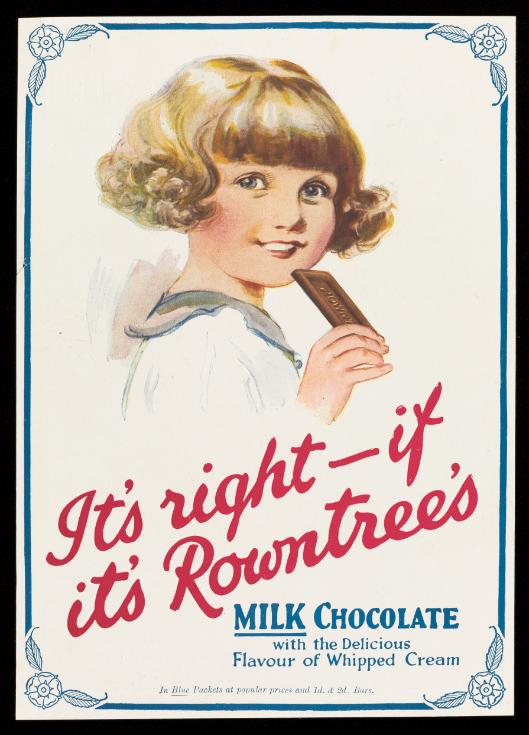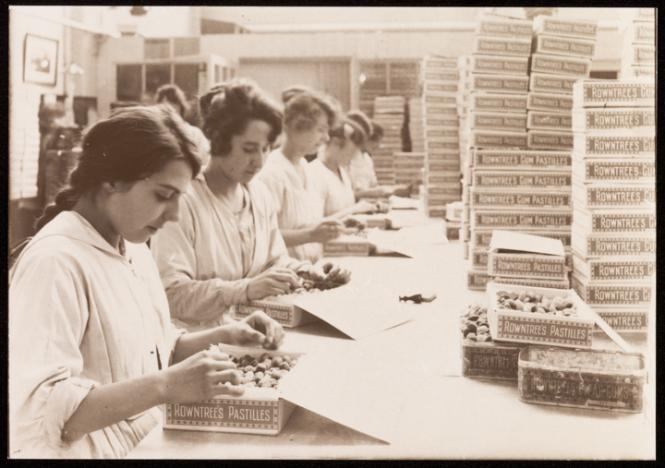Rowntree archives
The Borthwick Institute holds the largest collection of Rowntree archives in the world. These include records relating to the Rowntree company, family, Trusts, and theatre, as well as records relating to the family’s social research. The archives include everything from letters and diaries, to minute books, accounts, magazines, advertisements, audio and video recordings, and photographs.
Below you will find a short guide to navigating the range of archives we have available.

The Rowntree Family
The Rowntree family’s connection to York began in 1822 when Joseph Rowntree Senior moved to the city from Scarborough to establish his own grocery business. The principal Rowntree Family Papers are catalogued here, although the records of Lawrence Rowntree have been catalogued separately. These comprise the personal and often the professional papers of the Rowntrees and their spouses from the late 18th century to the present day, including all of the surviving research papers of pioneering social investigator Seebohm Rowntree. The catalogue is arranged by name and then by deposit so that we can preserve the provenance, or origins, of the groups of records. Highlights of the archive include the records of,
Joseph Rowntree Senior, the founder of the family grocery business at 28 Pavement, York
Joseph Rowntree, co-founder of the Rowntree confectionery company and a noted philanthropist who created the Rowntree Trusts in 1904
Julia Seebohm, descendant of a German born Quaker family and the first wife of Joseph Rowntree
Arnold Stephenson Rowntree, Liberal MP and pacifist who supported the rights of conscientious objectors in the First World War
Seebohm Rowntree, Chairman of the Rowntree confectionery company and social researcher
Lawrence Rowntree, grandson of Joseph Rowntree who served first with the pacifist Friends Ambulance Unit and then with the army in the First World War. He was killed in action at the Battle of Passchendaele in 1917.
The Rowntree Company
The Rowntree company grew from the cocoa, chocolate and chicory business of Henry Isaac Rowntree. Founded in 1862, his business was originally situated on the corner of Coppergate and Castlegate in York but moved, in 1864, to Tanners Moat. The company was in financial difficulties by 1869 when Henry’s brother Joseph Rowntree joined the business as a partner and took charge of its finances. The company slowly began to improve and had its first major success with the introduction of crystallised gum pastilles in 1881, expanding into premises on North Street. Henry died unexpectedly in 1883 leaving his share in the company to his brothers Joseph and John Stephenson. In 1897 the company was incorporated for the first time and its name was changed to Rowntree & Co Ltd. The company became one of the largest employers in York, responsible for well known chocolate brands such as KitKat, Aero, and Smarties, and its factory at Haxby Road was known for its pioneering approach to staff welfare and industrial management. Rowntree & Co Ltd merged with John Mackintosh & Sons Ltd of Halifax in 1969 to become Rowntree Mackintosh. The Borthwick holds all of the surviving company records from 1862 to the company’s takeover by Nestle in the late 1980s. These comprise the archives of,
Henry Isaac Rowntree & Co, the company that existed between 1862-1897
Rowntree & Co, the company 1897-1980s
Rowntree Associated Companies, subsidiary and associated companies
Additional Rowntree & Co papers collected by the Joseph Rowntree Foundation
John Mackintosh & Sons Ltd, the Halifax based confectionery company that merged with Rowntree & Co Ltd in 1969
William Wallace, Rowntree company secretary and later Chairman
Sir Donald Barron, Rowntree company accountant and later Chairman
Colin Burton, employee at John Mackintosh & Sons Ltd and then at Rowntree Mackintosh Ltd
The Rowntree Trusts
In 1904 Joseph Rowntree founded three trusts to continue his family’s pioneering work in the field of social reform, endowing them with half of his shares in the Rowntree confectionery company. These were the Joseph Rowntree Foundation (JRF) which began life as the Joseph Rowntree Village Trust; the Joseph Rowntree Charitable Trust (JRCT); and the Joseph Rowntree Reform Trust (JRRT), originally named the Joseph Rowntree Social Service Trust. Later a fourth trust, the Joseph Rowntree Housing Trust (JRHT), was created as part of the JRF. The Borthwick holds all of the archives of the Trusts from their foundation to around the 1960s, and then more sporadically thereafter - although further deposits are expected.
Records include detailed minute books and financial records, but also records of the projects and organisations funded by the Trusts. The archives of the JRF and JRHT also include a substantial number of records detailing the creation and development of the model village of New Earswick, outside York.
Joseph Rowntree Foundation as well as its associated collection of social research reports
Joseph Rowntree Charitable Trust
Other Collections at the Borthwick
The Borthwick holds a number of archives related to the Rowntree family, company, trusts and social research. These include the following,
The Joseph Rowntree Theatre Trust, the records of the theatre founded in York by the Rowntree company in 1935.
The Rowntree-Lavers Follow Up Surveys carried out in the 1970s and based upon the earlier poverty surveys of Seebohm Rowntree
The Rowntree Society, the records of the York based organisation with a mission to build and share knowledge about the histories of the Rowntree family, company and trusts and their continuing relevance today
The Family Fund, the fund was established to support families affected by the Thalidomide drug and was administered by the Joseph Rowntree Foundation
Educational Interchange Council, co-founded by Richard S. Rowntree to promote and assist cultural and educational visits between Britain and Europe following the Second World War
Honesty Girls Club, a club set up for teenage girls in York by Winifred Rowntree in 1902
John S. Gayner, records of Dr Gayner’s career as a doctor and resident of New Earswick
Tuke Family, the York Quaker family for whom Henry Isaac Rowntree worked. He purchased the cocoa, chocolate and chicory part of their business in 1862.


